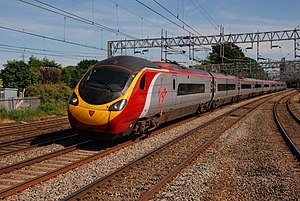British Rail Class 390
| British Rail Class 390 Pendolino | |
|---|---|

A Class 390 Pendolino passing through Rugeley in June 2010
|
|

The interior of Standard Class
|
|
| In service | 23 July 2002 – present |
| Manufacturer |
Alstom (Fiat Ferroviaria tilting system) |
| Built at |
Washwood Heath, England Savigliano, Italy |
| Family name | Pendolino |
| Replaced | |
| Constructed | 2001 – 2004 2009 – 2012 |
| Entered service | 2002 |
| Number built | 57 trainsets |
| Number scrapped | 1 trainset (due to the Grayrigg derailment) |
| Formation |
|
| Fleet numbers |
|
| Capacity |
|
| Operator(s) | Virgin Trains |
| Depot(s) | Manchester Train Depot |
| Line(s) served | West Coast Main Line |
| Specifications | |
| Car body construction | Aluminium |
| Car length | 23.9 m (78 ft 5 in) intermediate cars, 25.1 m (82 ft 4 in) cab cars |
| Width | 2.73 m (8 ft 11 in) |
| Height | 3.56 m (11 ft 8 in) |
| Doors | Hinged Plug, electrically driven |
| Maximum speed |
|
| Weight |
390/0: 466 tonnes (459 long tons; 514 short tons) 390/1: 567 tonnes (558 long tons; 625 short tons) |
| Traction motors | 2 × Alstom ONIX 800 (per motor car) |
| Power output |
|
| Electric system(s) | 25 kV 50 Hz AC Overhead |
| Current collection method | Pantograph |
| Bogies | Fiat/SIG tilting |
| Braking system(s) | Regenerative, Rheostatic, Disc |
| Safety system(s) | |
| Coupling system |
|
| Multiple working | No multiple facility, within class only |
| Track gauge | 1,435 mm (4 ft 8 1⁄2 in) standard gauge |
The Class 390 Pendolino is a type of electric high-speed train operated by Virgin Trains in the United Kingdom. They are electric multiple units using Fiat Ferroviaria's tilting train Pendolino technology and built by Alstom. Fifty-three 9-car units were originally built between 2001 and 2004 for operation on the West Coast Main Line (WCML), with an additional four trains and also a further 62 cars built between 2009 and 2012. The trains of the original batch were the last to be assembled at Alstom's Washwood Heath plant, before its closure in 2005. The remaining trains in the fleet were built in Italy.
The Class 390 is one of the fastest domestic electric multiple units operating in Britain, with a top speed of 140 mph (225 km/h); however, limitations to track signalling systems restrict the units to a maximum speed of 125 mph (200 km/h) in service. In September 2006, the Pendolino set a new speed record, completing the 401 miles (645 km) length of the West Coast Main Line from Glasgow Central to London Euston in 3 hours, 55 minutes, beating the 4-hour-14-minute record for the southbound run previously set in 1981 by its ancestor, British Rail's Advanced Passenger Train. The APT retains the ultimate speed record for this route, having completed the northbound journey between London Euston and Glasgow Central in 3 hours 52 minutes in 1984 which included a 5-minute delay due to a signal fault.
In September 2010, Virgin Trains and Alstom launched a co-branded Pendolino (390004) which was renamed “Alstom Pendolino” and carries a Virgin/Alstom livery on coaches A and K in recognition of the partnership between Alstom and Virgin Trains. The fleet is maintained at the Alstom Manchester Train Depot near Piccadilly station.
In 1997, Virgin Rail Group commenced operating the InterCity West Coast franchise with a commitment to replace the existing British Rail Class 86, 87 and 90 electric locomotives and Mark 2 and Mark 3 coaching stock with tilting trains. Virgin placed an order with Alstom/Fiat Ferroviaria. British Rail had intended to replace the existing fleet of trains on the West Coast Main Line (in conjunction with a planned route modernisation) as part of the InterCity 250 project, but this was cancelled by the government shortly before privatisation.
...
Wikipedia
